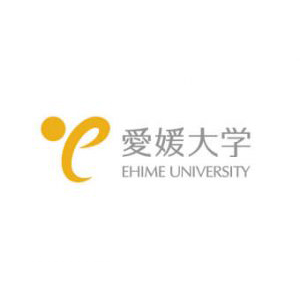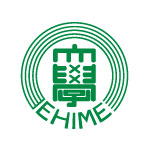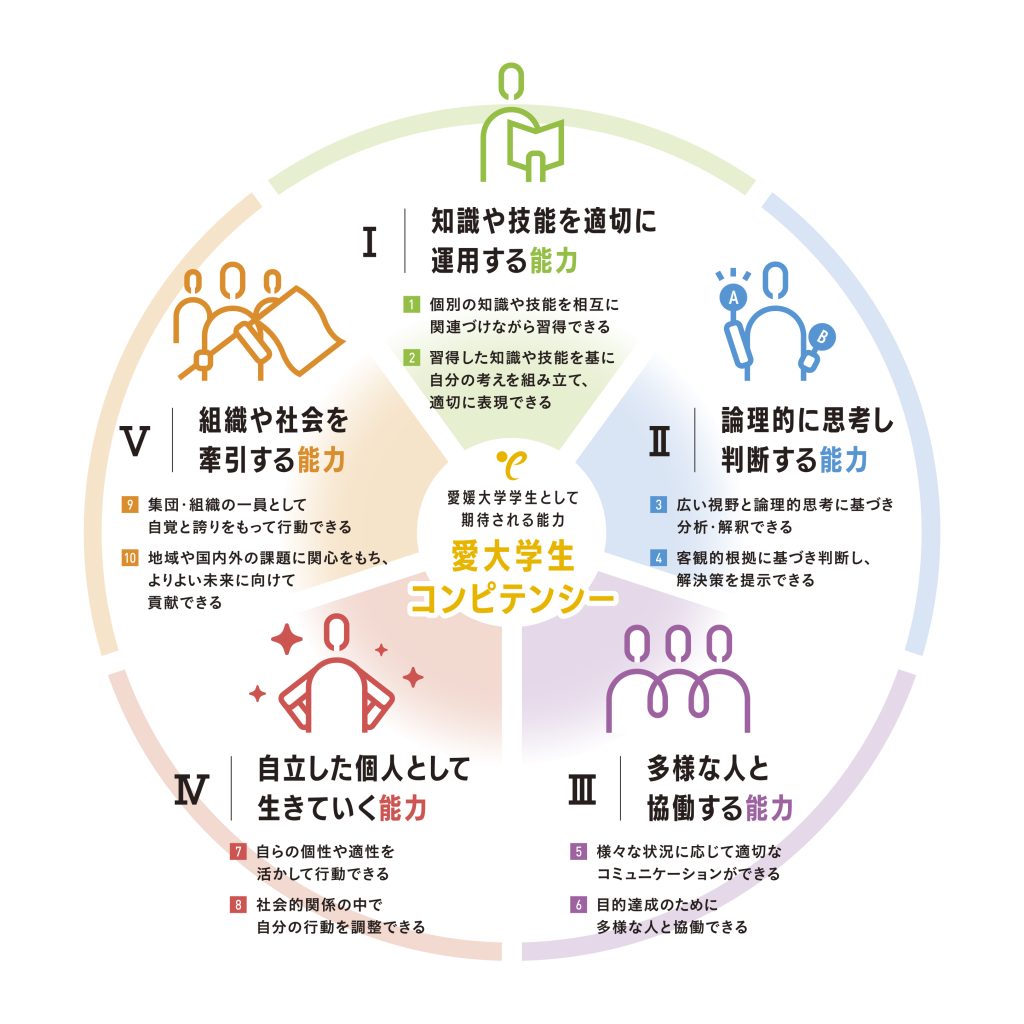Ehime University’s Three Policies (AP, CP, DP) for the Bachelor’s Program
Admission Policy of Ehime University
(AP: Admission Policy)
The type of student we are looking for
We seek students who have a lifelong desire to study and acquire the ability to think independently and overcome unexpected situations as a member of Ehime University, which upholds “a student-centered university,” “a university that shines together with the community,” and “a university that connects with the world” in its university charter.
Admission Selection
We select students based on a multifaceted and comprehensive evaluation of the basic knowledge and skills acquired in high school, the ability to use these skills, and the attitude to learn independently and in cooperation with diverse people. We also open our doors to a diverse range of students, including international students.
Ehime University Curriculum Policy
(CP: Curriculum Policy)
Education
In order to nurture human resources as stated in the graduation and degree awarding policies, common education and specialized education courses are systematically organized. The common education subjects consist of first-year subjects to introduce students from high school to university, basic subjects that support overall university learning and serve as the foundation for specialized education, and liberal arts subjects to cultivate a rich humanity. Specialized education courses are arranged based on the system of specialized fields. In addition to the syllabus that outlines classes, the relationship between courses and the sequence of study are shown in a course diagram and a course model to assist students in their coursework. In addition to the regular education courses included in the graduation requirements, various associate courses are offered with guidance and support from faculty members.
Educational Methods and Grading
In order to support students’ independent and self-directed learning, classes will be arranged in small groups from the lower grades, and active learning including experiential learning will be introduced in addition to lecture-style classes. In addition, we encourage students to study outside of class hours to ensure sufficient study time in all classes. Furthermore, all classes will be rigorously graded based on clear evaluation criteria.
Curriculum Evaluation
A university-wide student survey will be conducted to verify whether students are steadily acquiring the competencies indicated in the graduation and degree-awarding policies.
Diploma Policy of Ehime University
(DP: Policy for graduation recognition and degree awarding)
Human resources to be trained
Ehime University is committed to nurturing students with the five abilities set forth in the Ehime University Charter: the ability to apply knowledge and skills appropriately, the ability to think and judge logically, the ability to communicate with diverse people, the ability to live as an independent individual, and the ability to live as a member of an organization and society. Based on these five abilities, we have established the ” Ai University Student Competencies ” and presented the abilities that we expect all students to acquire by the time of graduation, regardless of their majors.
Graduation and degree conferral
Graduation is conferred upon students who have completed the educational program based on the educational objectives of the undergraduate department, etc., enrolled in the school for the prescribed period of time or longer, earned the prescribed credits based on rigorous grading, and fulfilled the graduation requirements.
reference
- Admission Policy (AP: Admission Policy)
It is a basic policy that defines how to admit students based on the educational philosophy of each university, faculty, department, etc., educational content based on the Diploma Policy, Curriculum Policy, etc., and indicates the learning outcomes (the “three elements of academic ability”) sought by accepted students. The policy also indicates the learning outcomes (i.e., what kind of outcomes the university seeks in terms of the “three elements of academic ability”) for students it accepts. - Curriculum Policy (CP: Curriculum Planning and Implementation Policy)
A basic policy that defines what kind of educational curriculum will be organized, what kind of educational content and methods will be implemented, and how the learning outcomes will be evaluated in order to achieve the Diploma Policy. - Diploma Policy (DP: Policy for graduation recognition and degree conferral)
This is a basic policy that defines what kind of abilities are recognized for graduation and degrees are conferred to those who have acquired them, based on the educational philosophy of each university, faculty, department, etc. It is also the goal of student learning outcomes.
The explanation of the three policies (Admission Policy, Curriculum Policy, and Diploma Policy) is as follows: “Graduation Accreditation and Degree Awarding Policy” (Diploma Policy), “Curriculum and Instruction Policy” (Curriculum Policy), and “Admission Policy” (Admission Policy). The above information is taken from the “Guidelines for the Formulation and Application of Admission Policies” (March 31, 2008, University Education Subcommittee, Central Council for Education, University Education Sectional Meeting).




